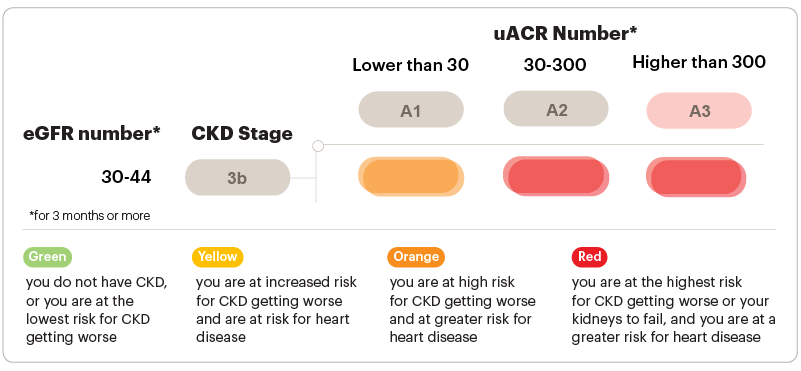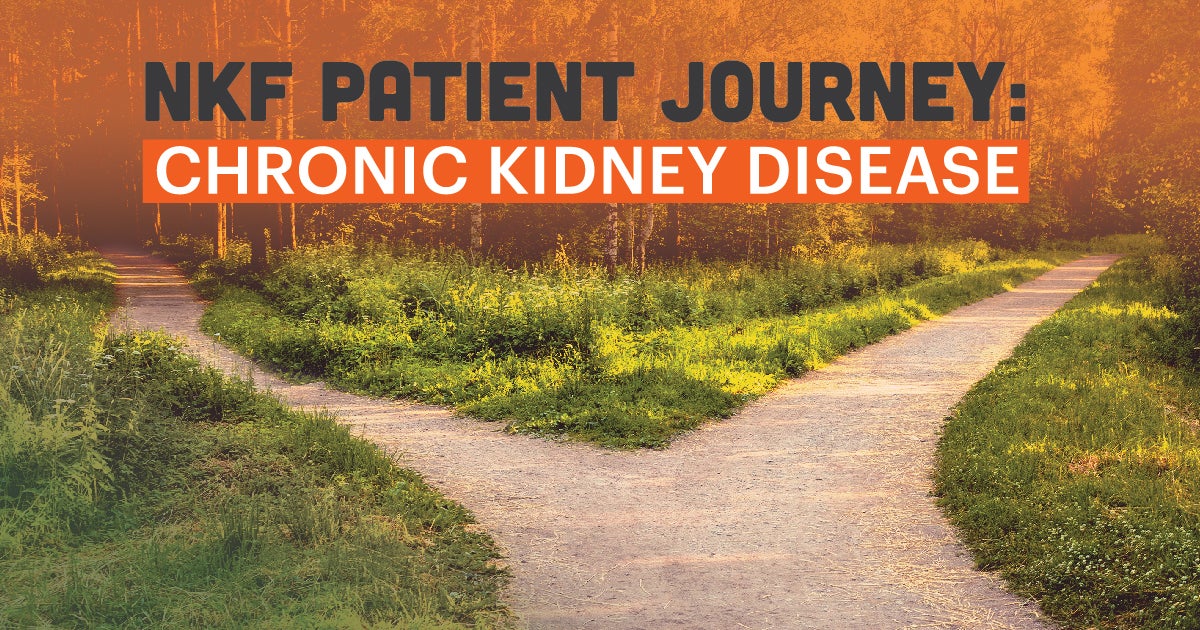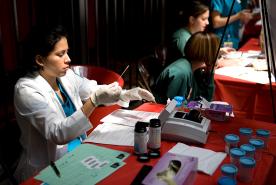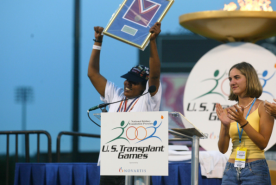Last Updated: July 06, 2023
Medically reviewed by NKF Patient Education Team
About Stage 3b CKD
Stage 3b CKD means you have moderate to severe loss of kidney function.
People with stage 3b CKD have an estimated glomerular filtration rate (eGFR) between 30 and 44 for 3 months or more (confirmed with repeat testing to make sure you don’t have acute kidney injury). Another way to think about these numbers is your kidneys are working at 30-44% of what the average two healthy kidneys in a young person can do.
Although urine albumin-creatinine ratio (uACR) results are not needed to confirm CKD at this stage, getting your uACR checked is still important to gain a full picture of your kidney health, as shown in the graphic below.
Although this is the third stage of CKD, stages 3a & 3b are when most people with CKD are first diagnosed.
Health risks with stage 3b CKD
In stage 3b CKD, you are at high risk for your CKD getting worse and you are at high risk for heart disease (even if your uACR is lower than 30). As your uACR number goes up, your risks of developing heart disease and CKD progression (worsening) both go up to the highest risk category (as seen in the figure below).

CKD complications
Stage 3b CKD is also when complications from kidney disease can start to appear, although the risk at this stage is low. These complications include:
- Anemia (low levels of red blood cells)
- Mineral and bone disorder (when blood levels of calcium and phosphorus are out of balance leading to bone and/or heart disease)
- Metabolic acidosis (buildup of acid in the blood)
Although the risk of having these complications is low when you are in stage 3b CKD, guidelines recommend getting screened now to make sure everything is okay (if you haven’t been screened yet). Screening for each of these complications can be done with simple blood tests ordered by your healthcare professional.
People with stage 3b CKD are also at increased risk of developing high blood pressure . So, it is important to have your blood pressure checked regularly.
Signs and symptoms
Stage 3b CKD is when symptoms may start to become more noticeable. Some of these symptoms may include:
- Urinating (peeing) more often or less often than usual
- Itchy and/or dry skin
- Feeling tired
- Trouble concentrating
- Numbness or swelling in your arms, legs, ankles, or feet
- Achy muscles or cramping
- Shortness of breath
- Nausea and/or vomiting
- Loss of appetite
Lifestyle recommendations
Now is a great time to make healthier lifestyle choices:
- If you smoke and/or use tobacco products, stop. Smoking can speed up the kidney disease process and increase your risk of getting kidney failure. It also increases your risk for other serious health problems, including high blood pressure, heart disease, cancers, and stroke.
- Exercise regularly. Remember, it’s okay to start slowly – taking short walks is a great way to begin.
- Sleeping well is important, too. Try to get enough sleep so you are well-rested.
- If you are overweight, losing weight through a balanced diet and physical activity can help improve your health in many ways.
- Find ways to reduce and manage stress in your life.
Nutrition
With stage 3b CKD, you may need to start changing the kinds of foods you eat.
If you have high blood pressure, it is important to limit your sodium (salt) intake to less than 2300 mg per day (about 1 teaspoon of salt from all the food and drinks you consume each day). Your healthcare professional may advise an even lower target depending on your other health conditions. This means a lot more than not using a saltshaker, but also limiting foods with high levels of sodium listed on their nutrition facts label. Some foods that don’t taste salty can have a surprising amount of sodium when you check their nutrition facts label.
Based on the results of your blood tests, your healthcare professional or kidney dietitian may also advise you to change how much potassium, phosphorus, and/or calcium you might be getting through your diet.
Recommendations are highly customized to your body’s specific needs and dietary preferences. So, ask your healthcare professional or kidney dietitian about potential dietary recommendations tailored to you.
Meeting with a dietitian can be especially helpful if you also have other health conditions like diabetes or heart failure where it may be important to limit other types of foods. It can feel overwhelming to keep track of so many changes, and a dietitian can help you identify what works best for you.
Additional information about eating healthy with kidney disease can be found on the Nutrition and Early Kidney Disease page.
Medications
In stage 3b CKD, some of your medications may start to build up in your body. This is because about half of all FDA-approved medications are removed from the blood by your kidneys. Ask your healthcare professional or pharmacist if any of your medication doses need to be lowered because of your stage 3b CKD. Some medications may be best avoided or limited in use as well.
Your healthcare professional may prescribe one or more medicines to help slow down or stop your CKD from getting worse. These medicines include an ACE inhibitor/ARB, an SGLT2 inhibitor and/or an nsMRA.
Your healthcare professional may also prescribe a statin (cholesterol medicine). Guidelines recommend a statin for people with stage 3b CKD who also have diabetes, a history of heart disease, or are age 50 or older. Even if you do not have high cholesterol, a statin can help lower your risk of having a heart attack or stroke.
You may also need to take additional medications or supplements to manage any CKD complications you might have (if applicable).
Always bring an updated list of any medications, vitamins, supplements, and herbal medicines you are taking to all your medical appointments and share it with your healthcare professional. Check with your healthcare professional or pharmacist before starting any supplements, herbal medicines, or other over-the-counter products
Other ways to lower your risk
In stage 3b CKD, lowering your risk for CKD progression is very important. This includes taking steps to manage other health conditions you may also have, including high blood pressure (hypertension), diabetes, and high cholesterol.
People with stage 3b CKD should also avoid certain pain medicines known as non-steroid anti-inflammatory drugs (NSAIDs). These can be harmful to your kidneys, especially at higher doses and/or with long-term use. Some examples include:
- ibuprofen (Motrin, Advil)
- indomethacin (Indocin)
- naproxen (Aleve, Naprosyn)
- diclofenac tablets or capsules (Cataflam, Zipsor)
- celecoxib (Celebrex)
- meloxicam (Mobic)
- aspirin (only if more than 325 mg per day)
Many of these medicines are available over the counter and may be sold under a different name or be mixed with other ingredients (like cough & cold medicines). Sometimes it may not be possible to avoid using these products depending on your other health conditions. Always ask your healthcare professional before using any products with these drug names or if the word “NSAID” is printed on the product’s label. In general, acetaminophen, also called Tylenol, is safe for your kidneys at recommended doses - but check with your healthcare professional first to determine the cause of your pain and the best way to treat it.
If your healthcare professional says you have metabolic acidosis, increasing the amount of fruits and vegetables you eat everyday can help lower the level of acid in your blood. This can also help slow down your CKD progression (worsening).
Additional considerations
Predicting your risk of kidney failure
In stage 3b CKD, it can be helpful to have a conversation with your healthcare professional about your specific risk for developing stage 5 CKD (kidney failure). Not everyone with stage 3b will develop kidney failure. You can estimate your risk of kidney failure (needing dialysis or a kidney transplant) in the next 2-5 years by using the kidney failure risk calculator. This calculator helps predict your risk based on factors like your age, sex, eGFR number, and uACR level. Keep in mind there may be other factors that can increase your risk that are not included in this calculator – for example, having blood pressure or blood sugar levels above your target range.
Remember - even if your risk score for kidney failure is low, having stage 3b CKD still puts you at high risk for cardiovascular disease (heart attack or stroke). So, taking steps to slow down your CKD progression (worsening) and lower your cardiovascular risk are still very important, no matter what your kidney failure risk score is.
If there is uncertainty about your risk or your kidney disease becomes difficult to manage, consider asking your healthcare professional for a referral to a nephrologist or kidney doctor.
What if I’m at high risk for kidney failure?
If you have stage 3b CKD and a high kidney failure risk score, it can be helpful to start learning about the different options available for treating stage 5 CKD (kidney failure). Although you may never develop kidney failure, knowing more about your options can help you plan early. Many people who are on dialysis or waiting for a kidney transplant report wishing they had started researching options earlier.
If you are thinking about getting a kidney transplant (even if you are not 100% sure), know that the entire process takes time. So, you may consider taking steps now to start the process. You’ll need to find the right transplant center for you, complete the transplant evaluation, and decide whether to find a living kidney donor or sign up for the kidney transplant waitlist. If you are able to be evaluated and find a living kidney donor soon enough, it may be possible to get the transplant before needing to start dialysis (also known as a preemptive transplant).
Questions to ask
Lowering risk
- Am I at a healthy weight?
- Is my blood pressure within the recommended goal range?
- Do I have diabetes or prediabetes? If so, is my A1C within the recommended goal range?
- Do I have albuminuria?
- How high is my level of risk for developing heart disease or a stroke? What can I do to lower my risk?
Monitoring
- What are my eGFR and uACR numbers?
- When should I have my eGFR and uACR tested again?
- What is my bicarbonate level? If it is below the goal level, what can I do to bring it up?
Medication safety
- Are the medications I am taking safe for me with stage 3b CKD?
- Should the dose of any of my medicines be lowered to prevent side effects or other problems?
Steps to take
- Are there any changes I should make to my diet?
- Are there any ingredients or foods that I should eat less of or avoid?
- Should I take any medication(s) to help lower my risk for CKD getting worse?
- Can you refer me to a kidney dietitian to help me make healthier food choices?
- Have I been screened for CKD complications like anemia, metabolic acidosis, or mineral and bone disorder? If not, can you please order these tests for me?
- When should I start seeing a nephrologist (kidney specialist)?
- Should I start thinking about treatment options for stage 5 CKD (kidney failure), such as dialysis and kidney transplant?
This content is provided for informational use only and is not intended as medical advice or as a substitute for the medical advice of a healthcare professional.


















